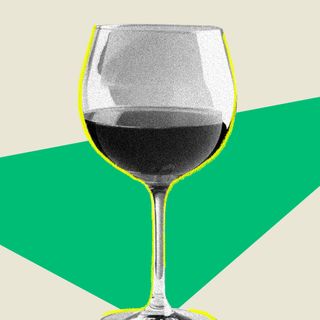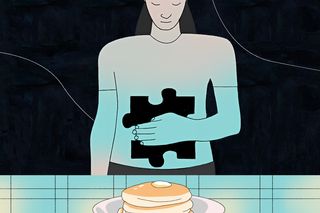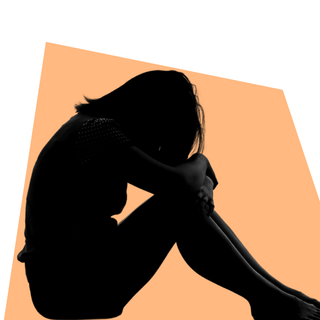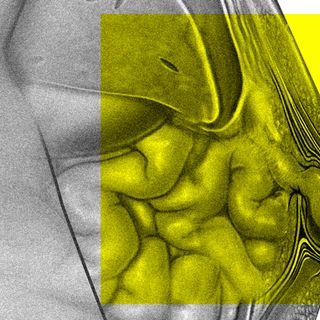
What It’s Like to Live With: No Stomach
“At [the time of my surgery], there were eight known cases in the world that were similar to mine — and seven of them were dead.”

What It’s Like to Live With explores the stories of people who see and experience every day a little differently.
If you have a heated argument with your mom over something very minor or insignificant, or get into a fight with a rikshawvala, these are things that put your body under stress, at that moment — and while you will probably forget about that stress after a few hours when you’re in a better mood, your body won’t have forgotten about it. And this stress keeps getting accumulated over time, like how boond-boond se samundar banta hai (little drops of water make a mighty ocean), you know? And then something big happens — like you lose your job, or a loved one, or your marriage falls apart — and your stomach can’t take that anymore because it was already too burdened.
And this stress is what led to the surgery to remove my stomach, because it had resulted in two perforated ulcers. Food was leaking out from my stomach into my body. It was very, very painful. It reached a point when I couldn’t even drink water. I went from 88 kilos to 38 kilos. That’s how much I weighed when I was on the operating table.
My family was told that I might not survive the anesthesia. It was a very, very difficult time for them as well. In fact, they were the ones, who had to make this life-changing decision for me to remove my stomach — I wasn’t in any state to. The day of my surgery, there was a Marathi movie being shot at the hospital. And it was a death scene. My husband, who had no idea about that, had gone down to get coffee for himself and my parents while they were waiting for me to get done with my eight to nine-hour-long surgery. While he was coming back up, he heard an actor from the shoot yell “Nahieeeee,” and he got scared thinking it’s my mother, and something had happened to me — he went and almost ruined their shoot trying to find out what happened. It was horrific for him. For my parents too — they aged like 10 years in just a month.
My surgery happened in 2011. The internet was very new to me then — I had spent the last five years just trying to stay alive, so I had never got the chance to get on the technology bandwagon until my surgery was done. This was when the time came for me to understand what I’d gone through, how to navigate life without my stomach, and I just didn’t know who to ask. At that time, there were eight known cases in the world that were similar to mine — and seven of them were dead; I was the last one standing. Who was going to ask about what to eat? I asked Google, Google failed me. I asked God, but God toh doesn’t talk to anybody only. I was lost.
I had to change the way I ate. And because I had no one to ask, I had to experiment with myself. The concept of breakfast, lunch and dinner have gone from my life. I can eat very, very limited quantities. The yolk of an egg is too heavy for me — so if I make a toast using just the egg whites, I’ll have to divide that toast into four parts because I can’t eat the whole thing at once anymore.
Related on The Swaddle:
What It’s Like to Live With: Ulcerative Colitis
The food goes directly into my intestines. There’s this thing called Dumping Syndrome, where the food reaches the intestine so fast that if I eat too much, or if I eat too fast, or if I eat something heavy — my body just shuts down. I will either sweat profusely, or go to the washroom and vomit. It’s a very uncomfortable feeling because I puke from my intestines, not my stomach. It literally boils down to one extra grain of rice.
Even though I relish vegetarian food more, non-vegetarian food is a very important part of my diet now because animal proteins last longer in the body. Also, the same food I made and ate yesterday — the same roti, the same cabbage — might not not be acceptable to my body today. I don’t know which day my body will decide to throw a tantrum, and I don’t have any control over it. I try to not let it overcome me.
Ever since the surgery, I don’t feel hungry anymore. But my energy levels do dip, and that’s my signal to eat something. I think I continued to be like 38 kilos, or maybe 40, for about four to five years post the surgery. I’ve been able to regain some of it back; not a lot. But I’m happy with my body.
Also, Vitamin B is produced in the stomach. Since I don’t have that anymore, I have to take Vitamin B injections every month for the rest of my life. Also, Vitamin B is what affects your memory the most, you know — I forget parts of conversations, people’s names, and so much more. People think I’m being a snob, but arre it’s a medical problem. Having said that, since the pandemic started, I’ve taken the injection just two or three times. I’m trying to substitute it with food rich in Vitamin B.
I’ve been a chef, and my life still revolves around food. I cook a lot — much more than what you might see on my social media, where I call myself ‘the gutless foodie.’ Today, for instance, I’ve cooked nine things — and that’s excluding things like rice and chapati. Since the pandemic started, I’ve been cooking food for senior citizens, who live in my building. And for my parents’ friends. Since their cooks couldn’t come, I found some of them were simply dipping bread in milk for dinner. Actually, even though everything is more functional now, I still send them food. I start my day with serving food to the security guards in my block. And after my husband comes back home in the evening, we end our day with feeding 13 or 14 dogs, who stay around our house. I start and end my day with food — you can’t stop loving what you loved so much.
But after the surgery, I started living. Until then, like most people, I was just existing. So, in a way, I think the surgery did wonders for me — it changed my perspective, made me less shallow, a little less self-absorbed. As a person, I’m very different today than I was 10 years ago. I was close to death when I was on the operating table in 2011, and now I can joke about it — if I can put a positive spin to death, then why not put a positive spin to life?
This interview has been condensed and edited for clarity. As told to Devrupa Rakshit.
Devrupa Rakshit is an Associate Editor at The Swaddle. She is a lawyer by education, a poet by accident, a painter by shaukh, and autistic by birth. You can find her on Instagram @devruparakshit.
Related


Researchers Find Metabolic Markers That May Predict Patients At Risk of Recurring Depressive Symptoms
